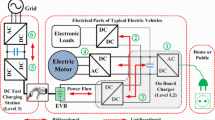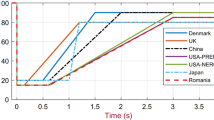Abstract
The optimization of the control strategy of a plug-in hybrid electric bus (PHEB) for the repeatedly driven bus route is a key technique to improve the fuel economy. The widely used rule-based (RB) control strategy is lacking in the global optimization property, while the global optimization algorithms have an unacceptable computation complexity for real-time application. Therefore, a novel hybrid dynamic programming-rule based (DPRB) algorithm is brought forward to solve the global energy optimization problem in a real-time controller of PHEB. Firstly, a control grid is built up for a given typical city bus route, according to the station locations and discrete levels of battery state of charge (SOC). Moreover, the decision variables for the energy optimization at each point of the control grid might be deduced from an off-line dynamic programming (DP) with the historical running information of the driving cycle. Meanwhile, the genetic algorithm (GA) is adopted to replace the quantization process of DP permissible control set to reduce the computation burden. Secondly, with the optimized decision variables as control parameters according to the position and battery SOC of a PHEB, a RB control is used as an implementable controller for the energy management. Simulation results demonstrate that the proposed DPRB might distribute electric energy more reasonably throughout the bus route, compared with the optimized RB. The proposed hybrid algorithm might give a practicable solution, which is a tradeoff between the applicability of RB and the global optimization property of DP.
Similar content being viewed by others
References
Yang C, Jiao X H, Li L, et al. Electromechanical coupling driving control for single-shaft parallel hybrid powertrain. Sci China Tech Sci, 2014, 57: 1–9
Gong Q M, Li Y Y, Peng Z R. Trip-based Optimal Power Management of Plug-in Hybrid Electric Vehicles. IEEE Trans Veh Tech, 2012, 57: 3393–3401
Sun D Y, Lin X Y, Qin D T, et al. Power-balancing instantaneous optimization energy management for a novel series-parallel hybrid electric bus. Chin J Mech E, 2012, 25: 1161–1170
Desai C. Design and optimization of hybrid electric vehicle drivetrain and control strategy parameters using evolutionary algorithms. Dissertation of Masteral Degree. Canada: Concordia University, 2010. 10–16
Wu L H, Wang Y N, et al. Multi-objective optimization of HEV fuel economy and emissions using the self-adaptive differential evolution algorithm. IEEE T Veh Technol, 2011, 60: 2458–2470
Montazeri-Gh M, Poursamad A, Ghalichi B. Application of genetic algorithm for optimization of control strategy in parallel hybrid electric vehicles. J Franklin Institute, 2006, 343: 420–435
Wirasingha S G, Emadi A. Classification and review of control strategies for plug-in hybrid electric vehicles. IEEE T Veh Technol, 2011, 60: 111–122
Torres J L, Gonzalez R, Gimenez A, et al. Energy management strategy for plug-in hybrid electric vehicles. A comparative study. Appl Energ, 2014, 113: 816–824
Lin C C, Peng H, Grizzle J W, et al. Power management strategy for a parallel hybrid electric truck. IEEE T Con Sys Tech, 2003, 11: 839–849
Wang Y H, Song J, Li X K. Simulation of AMT Autoshift Process Based on Matlab/Simulink/Stateflow. In: SAE 2004 Automotive Dynamics, Stability and Controls Conference. 2004-01-2055
Marano V, Onori S, Guezennec Y, et al. Lithium-ion batteries life estimation for plug-in hybrid electric vehicles. In: Proceedings of the IEEE Vehicle Power and Propulsion Conference. Dearborn, 2009. 536–543
Rein L. Iterative dynamic programming. Boca Raton: Chapman & Hall/CRC, 2000
Xu W, Peng Y, Wang B D. Evaluation of optimization operation models for cascaded hydropower reservoirs to utilize medium range forecasting inflow. Sci China Tech Sci, 2013, 56: 2540–2552
Zhao W Z, WANG C Y. Mixed H 2/H ∞ road feel control of EPS based on genetic algorithm. Sci China Tech Sci, 2012, 55: 72–80
Sadjadi F A. Comparison of fitness scaling functions in genetic algorithms with applications to optical processing. Proc SPIE, 2004, 5557: 356–364
Leung Y W, Wang Y P. An orthogonal genetic algorithm with quantization for global numerical optimization. IEEE T Evolut Comput, 2001, 5: 41–53
Author information
Authors and Affiliations
Corresponding author
Rights and permissions
About this article
Cite this article
Zhang, Y., Jiao, X., Li, L. et al. A hybrid dynamic programming-rule based algorithm for real-time energy optimization of plug-in hybrid electric bus. Sci. China Technol. Sci. 57, 2542–2550 (2014). https://doi.org/10.1007/s11431-014-5690-2
Received:
Accepted:
Published:
Issue Date:
DOI: https://doi.org/10.1007/s11431-014-5690-2




